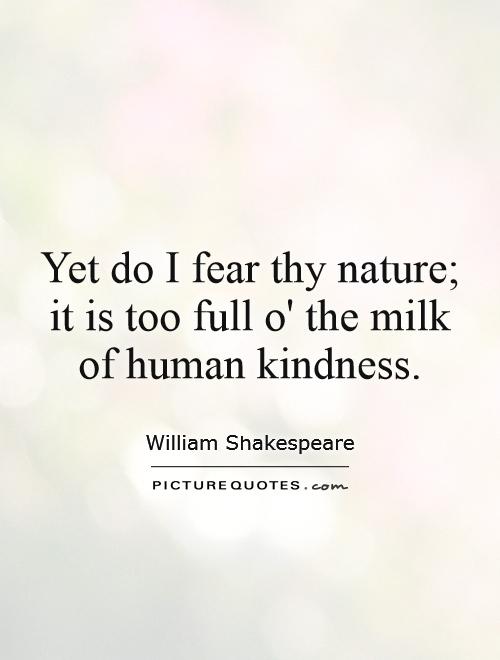Yet do I fear thy nature; it is too full o' the milk of human kindness

Yet do I fear thy nature; it is too full o' the milk of human kindness
In William Shakespeare's play Macbeth, Lady Macbeth speaks these words to her husband as she contemplates his ambition to become king. She fears that Macbeth's nature is too kind and compassionate to carry out the ruthless actions necessary to seize the throne. This line reveals Lady Macbeth's understanding of her husband's character and her own willingness to manipulate him in order to achieve their shared goal of power.Lady Macbeth's fear of Macbeth's "milk of human kindness" reflects a common theme in Shakespeare's works: the struggle between ambition and morality. Throughout the play, Macbeth is torn between his desire for power and his conscience. Lady Macbeth recognizes this internal conflict in her husband and seeks to push him towards his goal by questioning his masculinity and urging him to act decisively.
The phrase "milk of human kindness" suggests a softness and compassion that Lady Macbeth sees as a weakness in Macbeth's character. She believes that in order to achieve their ambitions, they must be willing to set aside their humanity and commit acts of violence and treachery. Lady Macbeth's fear is not only for Macbeth's ability to carry out their plan, but also for his ability to maintain his moral integrity in the face of temptation.
As the play progresses, Lady Macbeth's fears are realized as Macbeth becomes consumed by his ambition and descends into madness. The consequences of their actions weigh heavily on both characters, leading to guilt, paranoia, and ultimately their downfall.












 Friendship Quotes
Friendship Quotes Love Quotes
Love Quotes Life Quotes
Life Quotes Funny Quotes
Funny Quotes Motivational Quotes
Motivational Quotes Inspirational Quotes
Inspirational Quotes